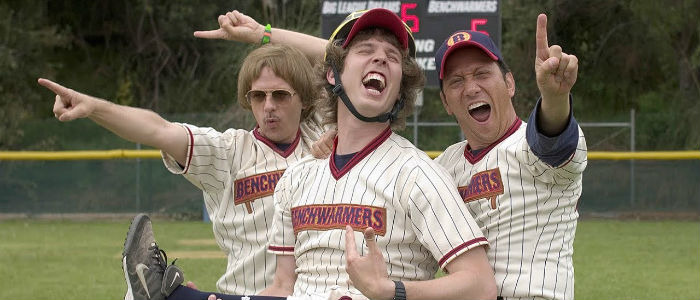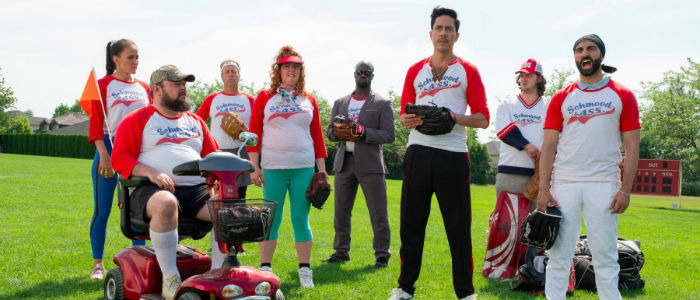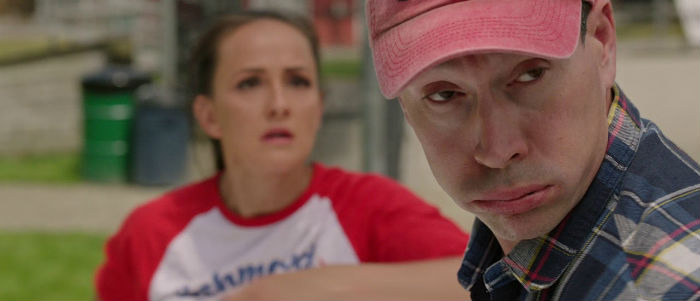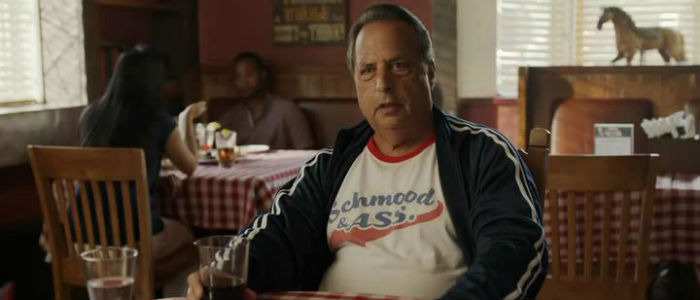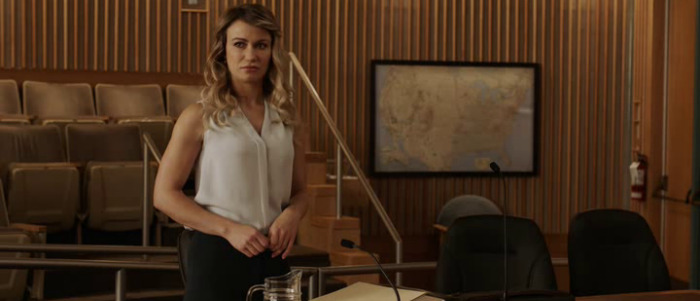Why The Hell Was 'Benchwarmers 2: Breaking Balls' Even Made And Who Actually Wants To See It?
(Welcome to DTV Descent, a series that explores the weird and wild world of direct-to-video sequels to theatrically released movies. In this edition, we get sporty with a sequel to an underdog baseball flick that even underdogs would disown.)
Comedy is subjective, so while I may worry about people who find 2006's The Benchwarmers to be funny I don't really wonder why. Instead, having watched it for the first time recently, I only have two real questions about the film. First, how in the hell did it cost $33 million to produce? And second, how in the hell did it make $64 million at the box-office? Both questions boggle me. I am boggled.
A theatrical sequel wouldn't necessarily have surprised me, though, as it made money and all three lead stars would clearly have said yes to it in a heartbeat, but thirteen years later we've gotten a direct-to-video one instead. The three "name" actors have been replaced by one, but don't worry, he's every bit as unfunny as they were. The cast isn't returning so the question becomes — should the audience? Spoiler, they should not, but keep reading for a more detailed answer.
Keep reading for a look at the latest tax write-off from Universal's home video division, Benchwarmers 2: Breaking Balls.
The Beginning
2006's The Benchwarmers has a simple premise. Three men struggling to stand tall in their adult lives come together for the kind of baseball fun that eluded them as boys. Trouble arises, though, when a local kids league muscles in and challenges the trio while bullying everyone in their path. The wealthy father of a kid bullied by the sporty punks decides to bankroll the three-man team and encourages a tournament that sees teams vying for a new stadium. "The Benchwarmers" face off against several kids teams — they're much younger but also have full rosters compared to our heroes — before coming face to face with the bullies in the championship. Can they beat the jerks and finally stand tall as winners? Or will they settle for being real men instead.
The DTV Plot
A pitch to the genitals ends Ben McGrath's budding baseball career, and years later he's working a landscaping job and struggling to become a lawyer. His succeeds, but his shoddy credentials don't get him very far as the only firm that will hire him only wants him for his baseball skills to help them win the region's softball league for lawyers. Still traumatized by the hit to the sack he's unable to help and quickly fired, but he finds salvation in a sketchy law firm owned by a robot-hating millionaire. Ben decides to coach the team while also trying to win a big case against the city and be a good father to his young son who wears a protective cup in his pants after seeing his dad's crotch-focused incident. Can he juggle all three things? Will he drop some balls? Will anyone ever laugh again?
Talent Shift
Rob Schneider, David Spade, and Jon Heder headline the original, and while at least two of them earned laughs earlier in their career the shift into film hasn't exactly been as consistent. Again, though, comedy is subjective, and they've clearly never been hurting for work so what do I know. One thing we can agree on is that both Schneider and Spade were already popular (enough) and well-known as funny guys. Heder was destined for milk cartons, but he was at least hot off of Napoleon Dynamite (2004) at the time. To that end all three were known quantities who had previously headlined their own features. Director Dennis Dugan was similarly afflicted at the time — and even more so since — with a series of financial successes (Problem Child, 1990; Big Daddy, 1999) that aren't funny despite being categorized as comedies. (FYI, his films have gone on to gross nearly $2 billion at the box-office, so again, take my thoughts on comedy with a sneer of suspicion.)
None of them return for the sequel, but we do get a repeat appearance by Jon Lovitz as the millionaire financing the baseball tournament in the first film and slumming it in the second. The leads, though, are replaced by the one and only Chris Klein. You probably remember him from American Pie (1999) and its sequels (Again with the Pies?, 2001; Please Stop Shtupping the Pastry, 2012), but his greatest achievement remains Street Fighter: The Legend of Chun-Li (2009). I'm not even joking. Director Jonathan A. Rosenbaum has been a television veteran since 1998, and he's making his feature debut here. Expect more TV work from him soon.
How the Sequel Respects the Original
The core idea through both films remains the same in that they pit inept adults against better baseball players, but the "heroes" ultimately win anyway because their hearts are so damn big or something. The message is a positive one as both good sportsmanship and a stand against bullying are always worth encouraging. Is that message enough though? (Rhetorical.)
How the Sequel S***s on the Original
Normally this is the section where I'd reel off the things the sequel does poorly or at odds with its predecessor, but neither film is funny and both are content being stupid, obnoxious, and offensive. That last element, though, is where the sequel makes far more missteps. Both movies use a little person for easy "laughs" and embrace crude behavior, but the sequel ramps it up a bit in odd ways for a 2019 release. The good guys have a gay member on their team who our hero refers to as creepy. The city's Asian female neighbor has a side job at a seedy massage parlor. The team's resident sexpot talks in innuendo – "I've been dying to come, but I just took on a massive load, and my back is up against the wall." – but repeatedly slaps guys who say things she mistakenly suspects are sexual harassment... and yes, of course she strips down (in PG-13 fashion) to win some points during the big game.
The other area where the sequel screws up a very simple concept is in the secondary plot. I know, more story should be a good thing, but the court case takes up a surprising amount of time in a film that's otherwise about a bunch of exaggerated idiots learning how to play baseball. We get multiple scenes in the courtroom, time spent pouring through records, and meaningless conversations about zoning, dumps, and eminent domain. Richard Bachman's Roadwork this isn't, and rather than story points of interest or merit we're just plodding along waiting to return to the baseball field. Boo-ring.
Conclusion
Look, I'm not proud of it, but I've laughed at the shenanigans of both Spade and Schneider in the past. Heder not so much, but the other two have shown comedic timing and skills enough to make them bearable. Klein is not a comedian, though, meaning he lacks the ability to deliver laughs through his performance and is entirely dependent on the script and direction. Unfortunately for him — and for anyone one foolish enough to pay cash money on Breaking Balls — neither the writer nor the director can find the funny either.Read more DTV Descent entries here.

